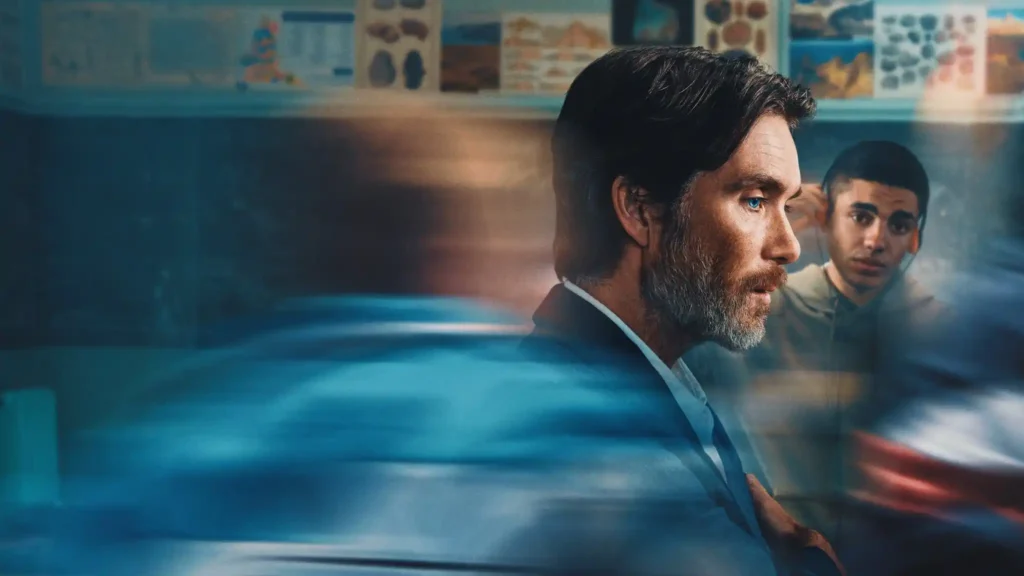
Steve is named after Cillian Murphy’s character, a spiralling reform college headteacher who’s in the midst of a substance abuse-accelerated mental breakdown. The movie isn’t really about him, though, or at least not in isolation. In flipping the title and focus of the source material, Max Porter’s 2023 novella, Shy, director Tim Mielants’ movie is making the clear point that the line separating at-risk youth and the ostensibly put-together adults whose responsibility they are is sometimes so thin as to be near enough invisible.
The college, Stanton Wood, is a last-chance live-in school for extremely difficult teenage boys who have been banished from the state system. They all have histories of trauma and are prone to violence. At the taxpayer’s expense, which doesn’t go unmentioned, Steve and his small but dedicated staff try to break through to them, or at the very least keep them from killing each other or themselves. But it’s not easy. This is the mid-1990s, where Conservatism has slashed social care budgets and opened welcoming arms to private for-profit companies. At one point in the single day that comprises the film, Steve and his colleagues are told that the school has been sold off and will be shuttered in six months, leaving the already spiralling students adrift.
This is just one of several invasions by outsiders that reiterate how ambivalent the wider world is to reform colleges and those who need them. Another is a visit from Sir Hugh Montague Powell (Roger Allam), a pompous local Member of Parliament who’s essentially canvassing the kids for votes as they edge over 18. The most significant is the presence of a documentary film crew who are there to film what Steve believes is a brief human interest story to run at the end of the TV news. But the tone of the feature is sensationalistic and condemnatory, and the film crew giddily rushes to film every new outburst and fracas, willfully ignoring Steve’s explicit requests not to antagonise the boys, violate their privacy, or otherwise act like they’re on safari.

In other words, nobody gets it. Nobody, that is, except Steve and his team. But getting it and being able to cope with it are two different things. Despite his unflappable super-teacher demeanour, Steve starts popping pills in the car on the way to work and doesn’t stop until day’s end, at which point he’s pickled in a cocktail of booze and stimulants, half-dead from exhaustion, and on the cusp of complete mental collapse. He’s arguably less even-keel than several of the students, who’re played by a potent mix of upcoming and nonprofessional actors, the standout being Jay Lycurgo as the complex, volatile Shy, after whom the source material was titled. Steve is careful to make this comparison overtly, with Steve’s near-violent outburst upon hearing the news of Stanton Wood’s impending closure indistinguishable from several we see elsewhere.
While the movie is a showcase for Cillian Murphy first and foremost, it remains Shy’s story at its core, and allowing such a fine actor’s very actorly showcase of despair to be the lens through which we meet and get to know Shy is a calculated decision. His depressive arc after receiving a callous phone call from his mother explaining that she and his step-father have decided to cease all contact with him – Lycurgo is remarkable here and should win something for this scene alone – runs throughout the film’s firmament like a fault line, with Steve’s nature bringing him tantalisingly close to a breakthrough just as his own barely-concealed issues and the competing pressures of keeping an understaffed and underfunded institution from erupting into chaos keep pulling him frustratingly out of reach.
Like Shy, Steve keeps all of his pain – physical and otherwise – bottled up. He can’t quite pull the wool over the eyes of the deputy head, Amanda (Tracey Ullman, Black Doves), and tellingly not Shy himself, whose inability to process his own issues leads him to defensively scratch at Steve’s. But the other members of staff have their own problems. School therapist Jenny (Emily Watson) has a couple of close-to-the-bone one-on-one scenes with the students, and new hire Shola (Little Simz, also seen on Netflix in Top Boy) is reeling from sexually inappropriate remarks and behaviour directed at her by one of the other students.
Using grainy VHS footage from the news segment to diversify the visuals, Steve also cracks small but illuminating windows into each child’s psyche, a gimmick that pays off in a coda revealing Steve’s personal insights into and opinions of each student. It’s a lovely little display of the character’s – and, by extension, the film’s – innate sense of empathy, its patience and understanding of nuanced people with complex issues, and its willingness to fight, even by proxy, for the help they need and deserve.
RELATED:
- Steve Ending Explained


